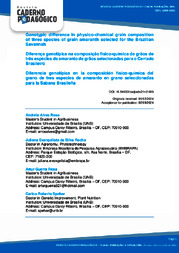Genotypic difference in physico-chemical grain composition of three species of grain amaranth selected for the Brazilian Savannah.
Genotypic difference in physico-chemical grain composition of three species of grain amaranth selected for the Brazilian Savannah.
Author(s): ROSA, A. A.; ROCHA, J. E. da S.; ROSA, A. G.; SPEHAR, C. R.
Summary: Seventeen genotypes, representing three species of grain amaranth, were analyzed for physico-chemical components. These genotypes are considered outstanding in terms of agronomical performance, necessitating an understanding of protein, lipids, fiber, and carbohydrate content. It has been demonstrated that A. cruentus, A. hypochondriacus, and A. caudatus differ in the content and properties of these compounds. Based on field experiments conducted in the Brazilian Savannahs, these genotypes were initially tested for germination and vigor after 12 years of storage under low moisture conditions at 10°C in air-tight plastic bags. Assuming that the physico-chemical characteristics were maintained, as indicated by an average 80% germination rate, samples of amaranth seeds were milled and used for analysis. The results indicate protein content below expectations, with the highest values above 14g per 100g, while lipids, fiber, and carbohydrates are within the expected range. The possible factors to explain these results are related to the cultivation environment, although genotypic differences are also significant. Additional testing with broad-based selected lines is necessary to improve selection for both agronomic and physico-chemical composition. The present results suggest that efforts should be concentrated on A. cruentus and A. hypochondriacus.
Publication year: 2024
Types of publication: Journal article
Unit: Embrapa Agroenergy
Keywords: Amaranth grain, Genotype, Physicochemical properties, Proteins
Observation
Some of Embrapa's publications are published as ePub files. To read them, use or download one of the following free software options to your computer or mobile device. Android: Google Play Books; IOS: iBooks; Windows and Linux: Calibre.
Access other publications
Access the Agricultural Research Database (BDPA) to consult Embrapa's full library collection and records.
Visit Embrapa Bookstore to purchase books and other publications sold by Embrapa.

